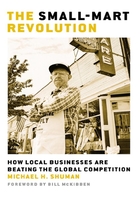
FOREWORD
This is a badly needed book.
I say that for several reasons. The first, and most obvious, is that almost anyone who has taken the time to study the situation now knows what a death star the big box on the edge of town is. When WalMart and its kind first began metastasizing across the landscape, it was impossible to say for sure what the effect would be. Perhaps people would just go there for a few items they couldn’t purchase locally (in my town, small appliances) and would continue to patronize local stores for the rest. Perhaps they would so add to the general prosperity of a neighborhood that everyone’s boat would be lifted on their swelling tide. As it turned out, that’s not what happened. Local downtowns were depopulated—a few cars parked aimlessly by the courthouse on a Saturday morning where once there had been hundreds of people coming “into town.” Jobs were lost—one and a half for every job created—and the jobs that weren’t lost often paid less because now the big boys set the local wage scale. At the end of a decade, according to one thorough study, counties with the massive bargain depots had become poorer compared to those without. This is the intellectual landscape in which this book emerges—we are ready for the message.
The second reason is that fairly few people, even when they sensed these realities, could conceive of an alternative. Wal-Mart and its kin seemed to be inevitable, as unstoppable as a missile in flight. Michael Shuman, throughout his career, has done us the great service of dispelling that myth and showing us that these behemoths can be stopped.
And third, and by far most important, he shows us that in the end the crucial question is not stopping Wal-Mart at all. It’s not about stopping anything. It’s about starting something—vibrant local economies that will make our cities and towns the places we very much want them to be.
This revolution is of the first importance. It may well turn out to be one of the keys to containing global warming, for instance. (If the average bite of food didn’t have to travel two thousand miles before it reached your lips; if the power for your block came from the windmill in the cul-de-sac; if the local bus was a pleasure to ride—think of the carbon that could be saved). It may, by shortening supply lines, help us ward off the worst effects of peak oil. It may also turn out to be the key to saving democracy. I mean that quite literally: a giant-sized nation of 300 million is run by those most able to dominate public life, usually because of the power their corporate wealth confers. By contrast, a town that takes real control of its economic and social life insulates itself at least a little from the corrupt decision making of the central authorities.
But it’s finally important for another reason: we want and deserve the delight that comes with working communities. Wandering into a cavernous Wal-Mart is a desolate experience. Cheap, but cheap in every way. Wandering through a town where you depend on the people around you, and they depend on you—that’s called living. Humans were built for it. Michael Shuman shows us how it might happen again.
Bill McKibben